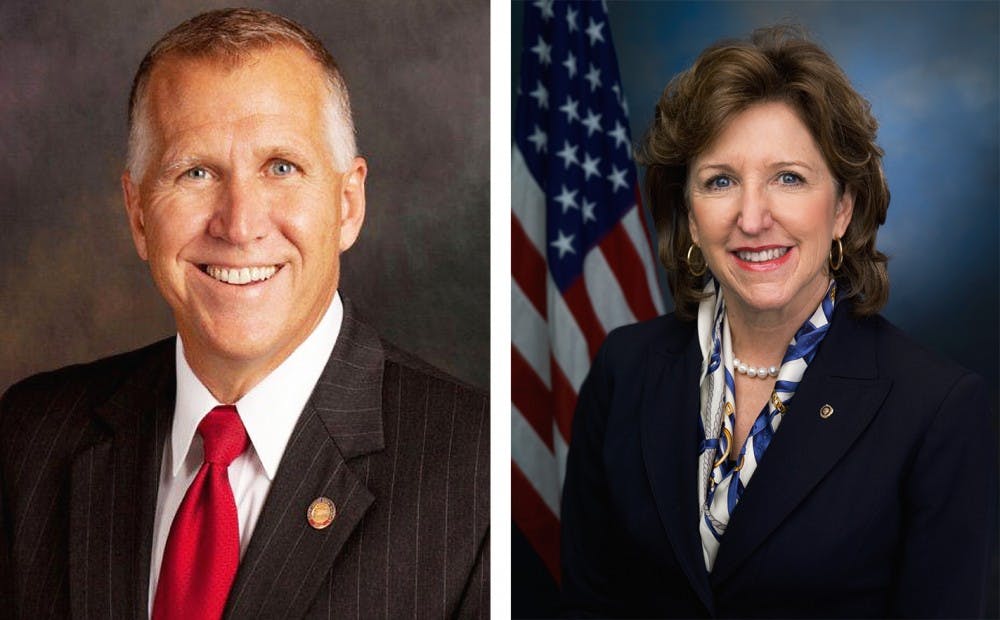North Carolina Republican voters have selected Thom Tillis to challenge Democratic Senator Kay Hagan for the state’s senate seat.
Currently Speaker of the North Carolina House of Representatives, Tillis outdistanced seven other candidates—the most in party history—with a total of 45.69 percent of the votes. Tillis’ great statewide appeal may come in part from his personal and political ties, said David Rohde, Ernestine Friedl professor of political science.
“Compared to the other primary candidates, he has closer relations with the business community and the Republican establishment,” he said. “[The appeal stems from] his party identification and the positive responses of those voters who like what the Republicans in the legislature have done.”
Tillis' ties to business and politics stem from his background. In addition to being Speaker of the House, he served as a member of the North Carolina House of Representatives for a number of years. Prior to this, he worked in the business consulting practice of PricewaterhouseCoopers where he ultimately became a partner.
The party primary this year was considerably different than previous years—not only due to the number of candidates but also due to their diversity. The candidates' professions ranged from physicians to church officials. They also differed in their platforms, campaigns and number of organizational sponsors. This lies in stark contrast to the Democratic primary, which featured only 3 candidates.
Some points of Tillis' party platform, listed on his website, include shrinking the federal government's influence on individual states, instituting pro-life policies and repealing the Affordable Care Act. These items are of concern to many Durham residents, said Stacie Konrie, a 34-year-old Durham resident.
“Much of Tillis’ platform is straight-forward and action-oriented,” she said. “I especially like his plans for reducing state budget and supporting small business."
Economic support is an aspect of Tillis’ platform that also appeals to John Smithson, a Durham resident and owner of a small business.
“Many people find his [Tillis’] stance on business to be very skewed, but has great ideas about how to bolster the economy in a way that benefits owners and consumers,” he said.
Tillis is battling Kay Hagan, the Democratic nominee, for the Senate seat. Kay Hagan has been in office since 2009 as a senator, and many think that this gives her a significant edge over Tillis despite his strong conservative platform.
“Tillis is one of the strongest Republican candidates, sure, but Hagan will be tough to beat,” Smithson noted. “Hagan has experience, which appeals even to me, a staunch Tillis fan.”
Tillis and the Republican party have turned to large campaign investments to balance out Hagan's apparent edge in experience. Tillis' campaign has spent a total of $7,191,480 in various campaign costs -- $2,161,224 more than Hagan's campaign has spent. A considerable amount of money came from individual donors -- the most from retired and real estate industries.
Tillis' campaign spending has taken a toll on his reservoirs of money. Tillis had about $1 million left in his budget at the time of the most recent campaign finance report in April. Kay Hagan, on the other hand, has $8.6 million left towards the general campaign. Hagan has relied mainly on individual donations overall in campaign fundraising while contributions to the Tillis campaign are more split between individual donations and Political Action Committee donations.
In addition to staying afloat financially, Tillis will also face a challenge of combatting the movement of the Moral Monday protests, which have targeted him and the Republican General Assembly over the past several months for the enactment of conservative policies.
“I will be an independent thinker; I will be a problem solver,” Tillis said.
Get The Chronicle straight to your inbox
Signup for our weekly newsletter. Cancel at any time.

